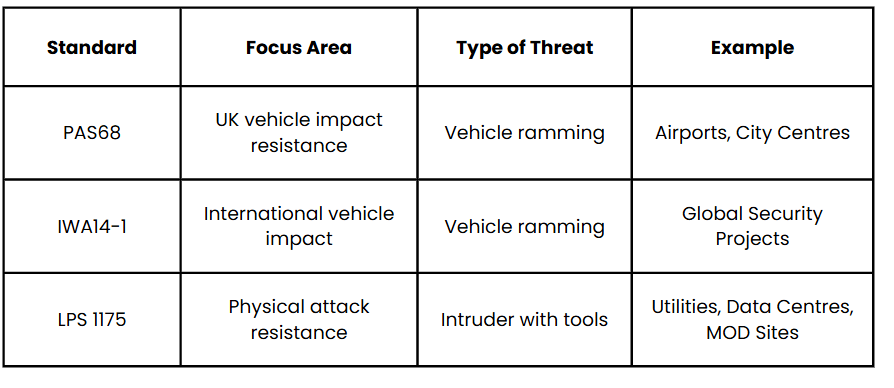First Facts: Your Guide to Security Ratings: LPS1175, PAS68 & IWA14-1

What Security Standards Really Mean
Intrusion Protection: LPS 1175
When it comes to protecting buildings and enclosures from forced entry by individuals, LPS 1175 is the go-to standard in the UK.
This standard evaluates how long a product can resist forced entry when subjected to attack using a defined set of tools. It simulates real-world break-in attempts, assuming attackers are prepared to use various tools and make noise.
LPS 1175 uses a grading system that combines a Tool Category (A to H) with a Delay Time (1 to 20 minutes). The higher the category and delay, the greater the resistance.
Tool Categories: These specify the type and power of tools an intruder might use:
- Category A: Opportunist tools, easily concealed (screwdrivers, knives, pliers)
- Category B: Hand tools with higher mechanical advantage (claw hammers, drills, bolt cutters)
- Category C: Wider selection of hand tools with significant mechanical advantage (axes, crowbars, cordless drills)
- Category D: More powerful tools, including some power tools (felling axes, sledgehammers, jigsaws)
- Categories E to H: Progressively more powerful tools and greater attack sophistication, including tools typically used by fire and rescue teams (circular saws, reciprocating saws)
Delay Time: This indicates the minimum time the product can withstand a sustained attack using the specified tools.
PAS68: The UK Benchmark for High Impact Threats
This Publicly Available Specification (PAS) from the British Standards Institution (BSI) sets out detailed impact test specifications for vehicle security barrier systems, bollards and road blockers.
PAS68 tests assess a product’s ability to resist penetration, absorb and redistribute impact energy, and maintain structural integrity. Crucially, it also considers the dispersal of major debris post-impact.
For the testing process, products are subjected to impacts from specific vehicle types (e.g., a 7,500kg goods vehicle) at defined speeds (e.g., 80km/h) and angles (e.g., 90 degrees). The resulting classification (e.g., PAS 68:2010 7500(N3)/80/90:10.6/11.1) indicates the vehicle type and weight, impact speed, angle of attack, and the penetration distance (how far the vehicle travelled past the back of the barrier).
PAS68 allows for real vehicle impact tests, as well as simulated and pendulum tests.
IW14-1: The International Standard For HVM Barriers
The International Workshop Agreement (IWA) is overseen by the International Organisation for Standardisation (ISO) and was developed with global input, including from the UK and US. It’s essentially an evolution of the PAS68 standard.
It defines the essential impact performance requirements for vehicle security barriers. Similar to PAS68, it assesses penetration distance and how well the barrier immobilises the test vehicle. Unlike PAS68, it explicitly includes major debris in the performance rating.
IWA14-1 only uses real vehicle tests with driverless vehicles to simulate real-world impact scenarios. The classification (e.g., IWA 14-1:2013 V/7200[N2A]/80/90:06) details the test method (V for vehicle), vehicle type and weight, impact speed, angle of attack, and penetration distance.
For IWA14-1, penetration is measured from the front of the product (the “datum line”), whereas PAS68 measures from the back face. This can lead to considerable differences for certain product types.
In Summary

Why Do These Standards Matter
How Would These Impact You In The Fencing Industry
They Prove the Fence is in Working Order
You not only want a fence that looks strong, but you also want proof that it can stop a vehicle and keep out intruders, even with the use of tools.
It May be a Requirement for your Site
For certain sectors, using fencing that meets one or more of these standards may not be optional; it could be mandatory. This could be in sites such as airports, MOD sites, city centres, stadiums, and also for insurance requirements or planning permissions.
They Help Compare Products Easily
Standards give customers a clear, measurable way to compare fencing. It enables them to choose the right solution for their specific threat level.
Peace of Mind
Even residential or small businesses may want assurance that their investment is justified, and that their fence is genuinely secure. Also, it has been tested against real-world threats, not just marketing claims.
What Does First Fence Offer?
At First Fence, we understand that when it comes to protecting people, property, and critical infrastructure, guesswork just isn’t an option. That’s why we offer a growing range of LPS1175 SR1-rated products, independently tested and certified to resist opportunistic attacks using hand tools.
PaliFence® SR1 Rated Palisade Fencing and Gates
A robust, traditional solution designed to provide visual deterrence and tested intrusion resistance. Ideal for securing commercial, industrial and utility sites where a higher security rating is essential.
ProFence® SR1 Rated Mesh Fencing and Gates
A modern welded mesh system, engineered for strength and visibility. It offers an ideal balance between aesthetics and certified protection, making it suitable for data centres, warehouses and educational facilities.
Contact Us
For more information or a free, no obligation quote, give our friendly sales team a call on 01283 512 111.
Download the PDF version of First Facts: Your Guide to Security Ratings: LPS1175, PAS68 & IWA14-1.


